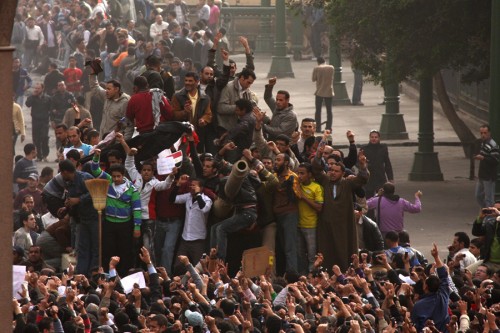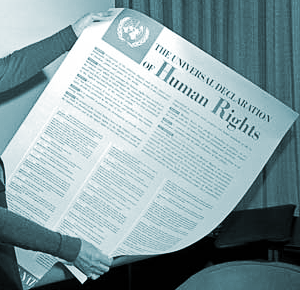
On 25 January 2011, the Egyptian people began a process that overthrew what was once considered an entrenched form of state control – a dictatorship. As the events transpired, its effects began to ripple throughout the nation, its neighbouring countries and across the world. Questions began to be raised by scholars, commentators and analysts on the configuration and role of the nation-state and most importantly, the responsibility of leaders to uphold and ensure the delivery of a universal standard of ethics and human rights. The Revolution in Egypt and the unrest over the despotism in Libya demonstrate how topical and urgent these questions remain. In this article I want to explore the relationship between state sovereignty and human rights by asking if it is necessary for one to trump the other or whether there can be a system and governance structure that provides an enabling environment for both.
I propose that when the rubric of ‘sovereignty’ is employed by a state to cloak human rights violations or redirect attention from the fundamental rights of its citizens, it should not hold authority and must be reconsidered. Yes, the nuances of the relationship between state sovereignty and human rights bring to light the distinction between what is and what ought to be. And admittedly, here I am referring to the latter.
In short, if a nation-state in its policies and practices serves goals or values that are antithetical to the principles and values enshrined in international institutions and conventions, it is perpetuating injustices against all of humanity. The deification of the nation-state by citizens, leaders and indeed, the international community, should be replaced with accountability and responsibility of leaders and governments to ensure the basic rights of their citizens. Shoghi Effendi powerfully explained this need in the following words:
Unification of the whole of mankind is the hall-mark of the stage which human society is now approaching. Unity of family, of tribe, of city-state, and nation have been successively attempted and fully established. World unity is the goal towards which a harassed humanity is striving. Nation-building has come to an end. The anarchy inherent in state sovereignty is moving towards a climax. A world, growing to maturity, must abandon this fetish, recognize the oneness and wholeness of human relationships, and establish once for all the machinery that can best incarnate this fundamental principle of its life.
 Where to begin? An initial step must be a prioritisation at the level of principle. State structures must first serve a set of universal values already proposed by established international institutions and conventions such as the Universal Declaration on Human Rights, rather than be preserved in the guise of ‘state sovereignty’ with unfettered freedom. Raised to this level of principle and value, the forms of government and governance that meet them can be better envisioned. Perhaps this is too theoretical. However, the backlash from the military in Libya and its ruler Gaddafi’s refusal to step down is illustrative of the absolute authority that in theory and practice has been created, preserved and perpetuated in the name of sovereignty. Globalists that argue nation-states are unable to determine their own fate because they have become embedded in regional and global networks miss the point. The principle of non-interference is expressed in Article 2(7) of the UN Charter, reinforcing the central principle of sovereignty in relations between nation-states. Some scholars have argued that in order to change the dire, unjust and extreme crises inflicting all societies, there requires a reform of the state system as a whole, not because the problems of poverty, illiteracy and other crises are ‘national’ problems but that primarily because they are global in nature, solutions cannot be made from the current state structures. It is evident of course that across the globe, leaders and government institutions continue to fall short of their responsibility to uphold the rights of their citizens. To some commentators, this may be further evidence that the authority of states is declining. But to wash our hands of state-authority, state-responsibility, and state-control altogether in the name of something ‘new’ (a ‘global order’?) would be premature. The latter has not be established, even if the forces of an emerging international/global/world order can be perceived – particularly in the areas of media, communications and collective political consciousness.
Where to begin? An initial step must be a prioritisation at the level of principle. State structures must first serve a set of universal values already proposed by established international institutions and conventions such as the Universal Declaration on Human Rights, rather than be preserved in the guise of ‘state sovereignty’ with unfettered freedom. Raised to this level of principle and value, the forms of government and governance that meet them can be better envisioned. Perhaps this is too theoretical. However, the backlash from the military in Libya and its ruler Gaddafi’s refusal to step down is illustrative of the absolute authority that in theory and practice has been created, preserved and perpetuated in the name of sovereignty. Globalists that argue nation-states are unable to determine their own fate because they have become embedded in regional and global networks miss the point. The principle of non-interference is expressed in Article 2(7) of the UN Charter, reinforcing the central principle of sovereignty in relations between nation-states. Some scholars have argued that in order to change the dire, unjust and extreme crises inflicting all societies, there requires a reform of the state system as a whole, not because the problems of poverty, illiteracy and other crises are ‘national’ problems but that primarily because they are global in nature, solutions cannot be made from the current state structures. It is evident of course that across the globe, leaders and government institutions continue to fall short of their responsibility to uphold the rights of their citizens. To some commentators, this may be further evidence that the authority of states is declining. But to wash our hands of state-authority, state-responsibility, and state-control altogether in the name of something ‘new’ (a ‘global order’?) would be premature. The latter has not be established, even if the forces of an emerging international/global/world order can be perceived – particularly in the areas of media, communications and collective political consciousness.
What is urgently needed is the political will to employ a truly global paradigm to shape and inform discussion and systemic change as antithetical to the present-day individualistic, distinct, and heterogeneous model of nation-states. There is certainly an argument to be made that the world is shrinking, merging into one neighbourhood. In some aspects, this is evident. However, across political landscapes, economic institutions, cultural and racial divisions, there remains much more that needs to occur – in agreed principles and systemic change – before the world can truly be regarded as one global community. Until then, nation-states and the individuals that comprise the institutions of their countries remain highly accountable to carry forward advancing societies and play their part in contributing to the peace, security and development of other nations – not only their own.